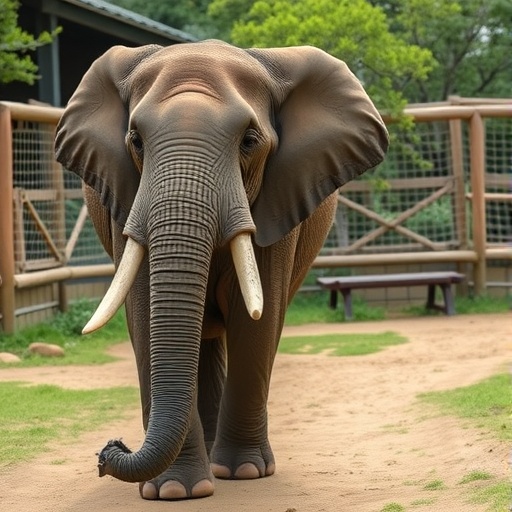In an intriguing revelation about the behavioral ecology of African elephants, a recent study conducted by researchers Hamburg, Clauss, and Dierkes shines a light on how individual personalities impact the responses of these majestic animals to novel stimuli within their environment. The researchers focused on captive African elephants, scientifically known as Loxodonta africana, to assess how variations in individual behavior could influence their interaction with new objects introduced in their habitats. This investigation offers profound insights into the personality traits of elephants and enhances our understanding of their cognitive capabilities and behavioral flexibility.
In the study, the researchers meticulously designed trials to present various novel objects to the elephants. The aim was to measure their reactions and interactions with these items, assessing factors such as curiosity, apprehension, and engagement. For such intelligent creatures, the introduction of unfamiliar objects serves as a critical assessment tool for their behavioral responses. It is also essential to gauge how environmental factors shape such responses, particularly in a captive setting where elephants may have limited control over their surroundings. The innovative approach taken in this research helps in elucidating the complexities of elephant behavior beyond mere instinct, suggesting a semblance of individuality that mirrors human personality traits.
The methodology employed in the study was rigorous and comprehensive. Elephants were filmed over numerous sessions that tracked their responses to an assortment of objects ranging from simple toys to more complex stimuli. The researchers used a standardized scoring system to evaluate behaviors such as exploration, manipulation, and avoidance. Observations were made regarding their body language, proximity to the object, and even vocalizations. Such a detailed analytical framework allows for a rich tapestry of data that could highlight significant variations in behavioral responses across individuals.
One of the notable findings was the marked difference in response times among the elephants. Some exhibited immediate curiosity, approaching new objects with eagerness, while others were significantly more tentative, showcasing a cautious demeanor. This stark individual variation suggests that elephants possess distinct personality traits, reinforcing the notion that behavioral ecology is not a one-size-fits-all approach. The implications of this discovery resonate deeply within conservation efforts and the management of captive elephant populations. Understanding that elephants can exhibit different levels of confidence and curiosity informs better practices in habitat enrichment and social pairing in zoos and sanctuaries.
Furthermore, the study also explored the concept of behavioral repeatability, determining how consistent individual responses remained over time. Remarkably, some elephants displayed a strong and repeatable pattern of behavior towards new objects, indicating that personality is not only inherent but also stable across experiences. This finding challenges traditional views on animal behavior, opening discussions about how personality influences not just individual interactions, but potentially social dynamics within elephant herds.
The researchers added another layer to their findings by correlating behavioral response patterns with physiological measures. Stress levels, as indicated by cortisol measurements, were assessed in tandem with behavioral data to provide a holistic view of the elephants’ well-being. In scenarios where elephants exhibited avoidance behaviors, cortisol levels were comparatively elevated, indicating that novel stimuli can also contribute to stress in certain individuals. This finding emphasizes the necessity for zoos and animal care professionals to consider individual differences when designing environments filled with stimuli, ensuring both mental engagement and emotional safety for these intelligent animals.
The implications of this research extend beyond the realm of captive management. Insights drawn from this study can inform efforts to conserve wild elephant populations, as understanding behavioral responses to novel threats could prove vital in developing effective strategies for human-elephant conflict mitigation. By recognizing how elephants interact with novel situations, conservationists can create interventions that consider the varying personalities within elephant herds, tailoring approaches to their behavioral tendencies.
As anthropogenic pressures and habitat encroachment escalate, the survival of elephant populations hinges on our ability to adapt our conservation messages and techniques. The findings of this study serve as a reminder of the sophistication of elephant intelligence and the necessity of empathy in their conservation. By seeing elephants as individuals with distinct behavioral patterns and responses, we can begin to reshape our narrative in wildlife conservation towards a more nuanced and respectful observation of these sentient beings.
In conclusion, the research conducted by Hamburg, Clauss, and Dierkes not only reveals significant findings regarding individual behavioral responses of African elephants to novel objects but also opens avenues for future research in animal behavior and conservation biology. This study emphasizes the intersection between personality traits and environmental interaction, illustrating a profound understanding of how African elephants perceive and react to the world around them. As we delve deeper into the complexities of animal behavior, it is increasingly clear that such insights propel forward not only scientific knowledge but also reinforce the imperative to preserve the intricate tapestry of wildlife that exists on our planet.
This pivotal body of work ultimately highlights a need for longitudinal studies to further explore these behavioral patterns, encouraging researchers to continue unraveling the nuanced intersections of personality, environment, and the dynamic changes that occur within animal behavior. As more light is shed upon these magnificent creatures, we are reminded of the importance of respecting their individuality as a component of their overall health and conservation.
Subject of Research: Individual variation in behavioral responses of captive African elephants to novel objects.
Article Title: Individual variation and repeatability of the behavioral response to novel objects in captive African elephants (Loxodonta africana).
Article References:
Hambrecht, S., Clauss, M. & Dierkes, P.W. Individual variation and repeatability of the behavioral response to novel objects in captive African elephants (Loxodonta africana).
Discov Anim 2, 70 (2025). https://doi.org/10.1007/s44338-025-00127-1
Image Credits: AI Generated
DOI:
Keywords: Elephant behavior, individual variation, captive elephants, novel objects, personality traits, conservation, animal ethology.
Tags: behavioral ecology of elephantsbehavioral flexibility in elephantscaptive African elephantscognitive capabilities of elephantscuriosity and engagement in elephantselephant personality traitsenvironmental factors affecting behaviorhuman-animal personality comparisonimpact of captivity on elephant behaviorindividual differences in animal behaviorinnovative research methods in animal studiesreactions to novel stimuli





